Key takeaways:
- Living off-grid fosters self-reliance and adaptability, leading to a deeper connection with nature and personal empowerment.
- Key technologies for off-grid living include solar panels, wind turbines, and water collection systems, which enhance sustainability and independence.
- Essential skills for off-grid living encompass food production, tool maintenance, and effective water management, contributing to a fulfilling lifestyle.
- Community support and celebrating small victories are vital lessons learned in off-grid living, enriching the overall experience and resilience.
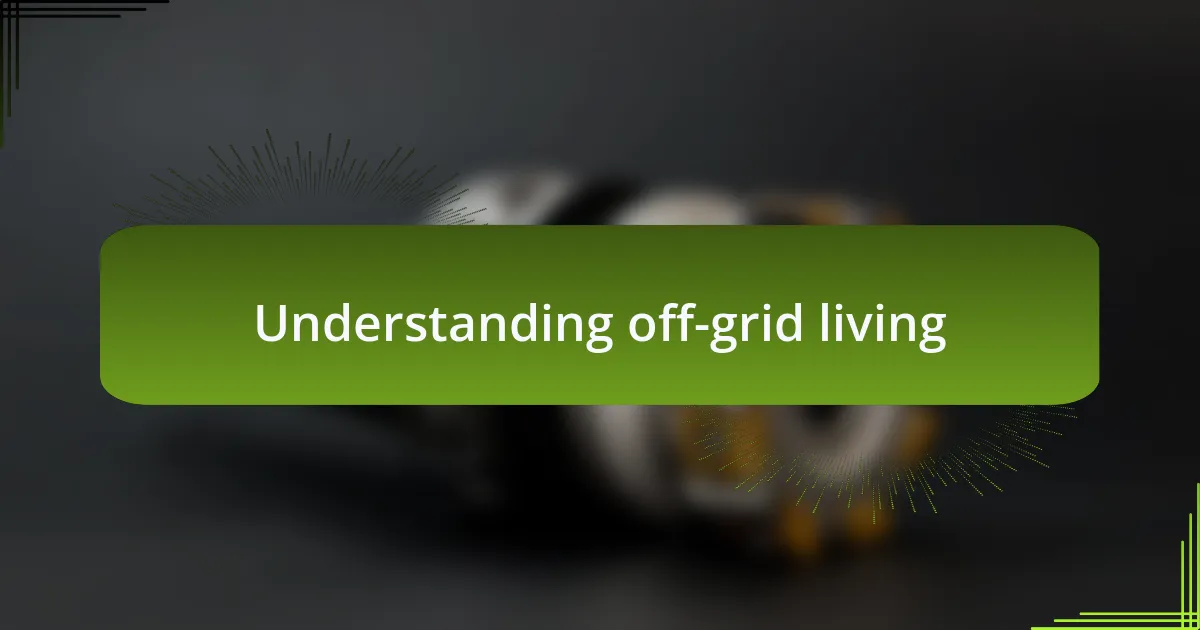
Understanding off-grid living
Living off-grid is not just about disconnecting from the utility grid; it’s about developing a deeper connection with the land and a sustained independence. I remember the first time I flipped a switch and realized nothing happened—not out of panic, but with a sense of freedom. That moment triggered a profound respect for relying solely on solar panels and my own resourcefulness.
What does it truly mean to thrive without the conveniences of society? For me, it meant embracing adaptability. I often found joy in simple tasks—like capturing rainwater or tending to a small vegetable garden. These practices not only fueled my survival but also instilled a sense of accomplishment and harmony with nature.
Every day in an off-grid lifestyle becomes a lesson in sustainability. As someone who once relied heavily on modern conveniences, I can attest that living without a constant electricity supply or running water forces you to rethink your daily habits. Have you ever paused to appreciate how much energy is wasted in an average home? Off-grid living sheds light on those patterns and encourages a more mindful approach to energy consumption and resource management.
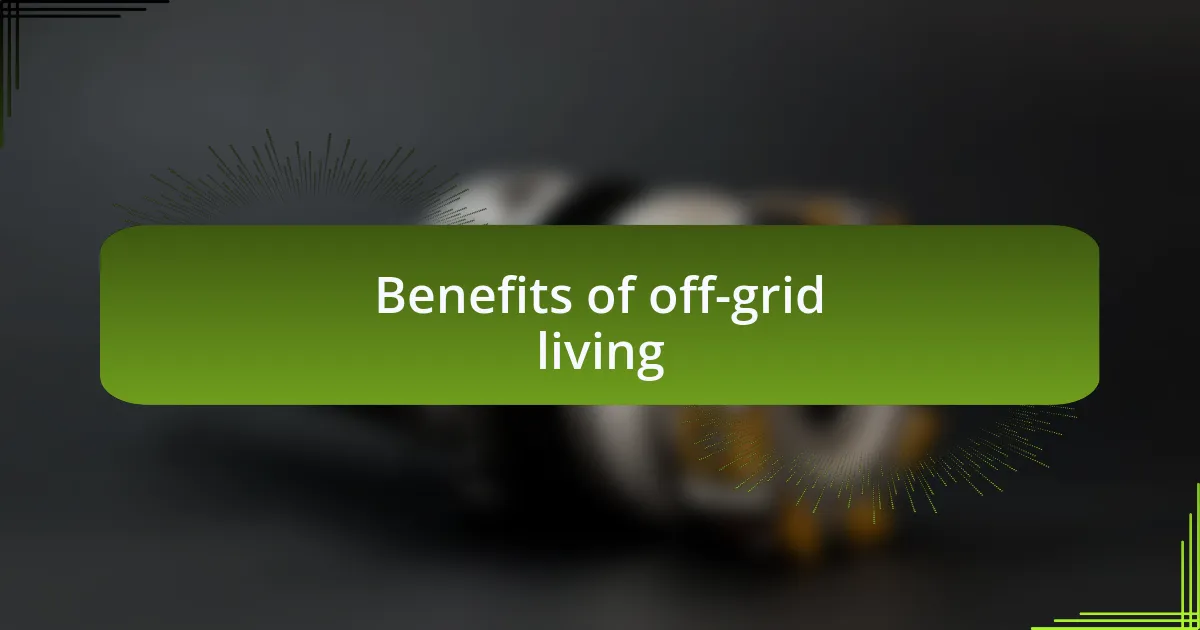
Benefits of off-grid living
Embracing an off-grid lifestyle brings a unique sense of empowerment. I remember the moment I harvested my first crop. The pride I felt after working the land—and knowing I produced my own food without relying on grocery stores—was indescribable. It’s liberating to realize you can sustain yourself, and that sense of independence extends to every aspect of life.
One of the most significant benefits I’ve experienced is the reduction in living costs. Without monthly utility bills, my budget transformed dramatically. I still recall the joy of checking my bank statement and seeing the impact of my choices. It raises an interesting question: How much could you save by living off-grid? For me, the financial freedom it offers makes the effort worthwhile.
Moreover, living off-grid fosters a profound connection with nature. During quiet evenings, with only the sounds of crickets and rustling leaves, I find peace in the simplicity of life. There’s a palpable difference in my mental clarity when I step away from the noise of urban living. Have you ever felt overwhelmed by constant distractions? Off-grid living encourages mindfulness and restores one’s appreciation for the natural world.
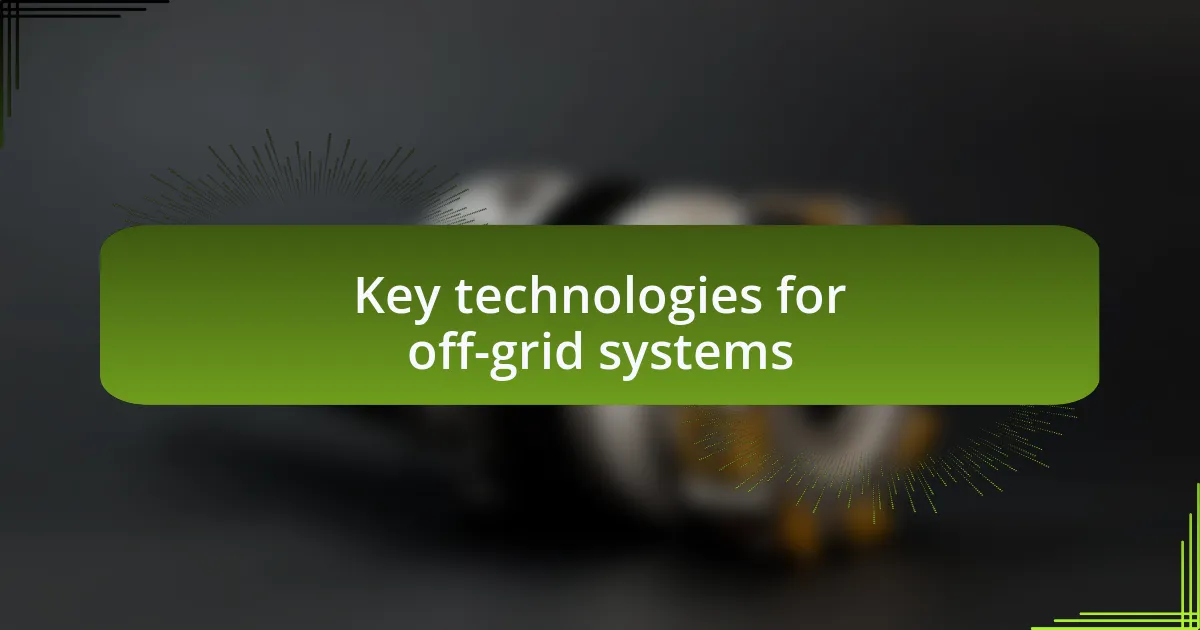
Key technologies for off-grid systems
When exploring key technologies for off-grid systems, renewable energy sources are at the forefront. Solar panels, for instance, have become an essential component of my setup. I vividly remember the day I installed my first solar panel; watching the sunlight convert to electricity was like witnessing magic. This technology not only powers my home but also provides me with an incredible sense of self-reliance. Have you ever thought about how sunlight could completely power your life?
Beyond solar energy, wind turbines can play a crucial role in off-grid living. I installed a small turbine and was amazed by its efficiency during windy days. The gentle hum of the turbine adds a comforting background noise, reminding me that I am harnessing nature’s power. The question often arises: can you really rely on just one source of energy? In my experience, having both solar and wind ensures that I have consistent energy throughout the year.
Water collection and filtration systems are equally important in an off-grid lifestyle. I recall the satisfaction I felt after building my rainwater collection system; knowing that I could collect and filter rainwater feels empowering. This technology is not just about convenience; it’s about sustainability and securing my independence. Have you considered how much water you use daily? It’s fascinating to think about how effectively managing water can significantly enhance your quality of life while living off the grid.
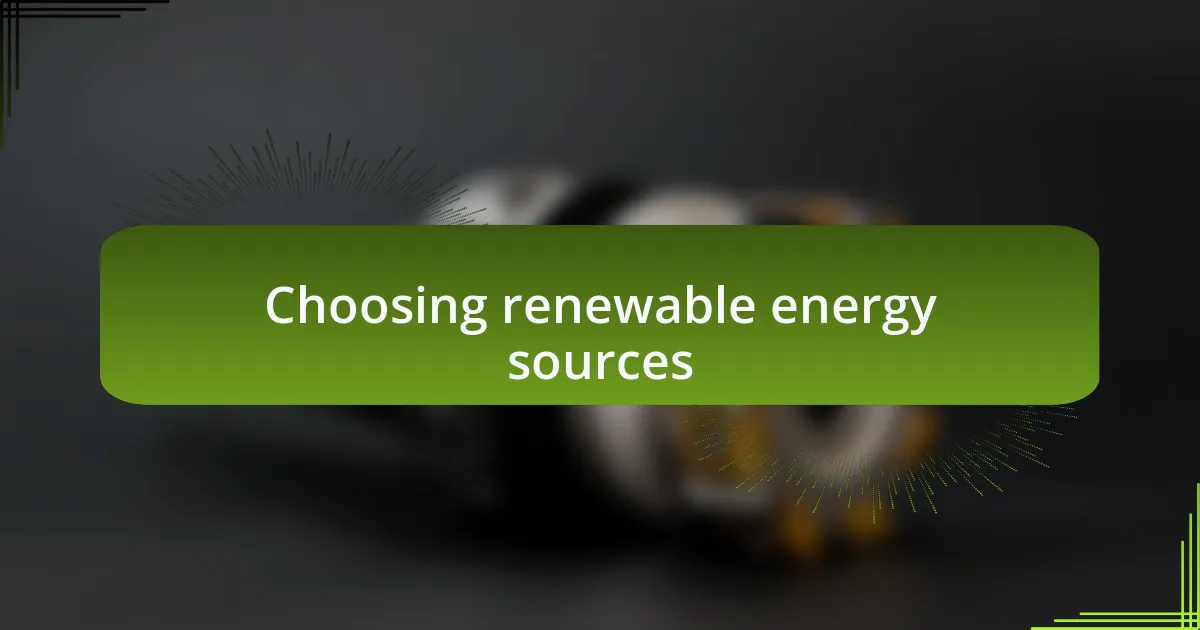
Choosing renewable energy sources
When it comes to choosing renewable energy sources, it’s crucial to consider your specific environment and energy needs. For example, I remember standing on my property, assessing the layout to determine where the sunlight hits the longest and the strongest. This thought process made me realize how essential it is to optimize placements for solar panels to capture maximum energy. Have you ever thought about how a slight adjustment in positioning can significantly impact energy efficiency?
Another aspect to ponder is the balance between energy sources. My first winter off-grid was a learning curve; I found myself relying heavily on my wind turbine during those cloudy days when solar energy was scarce. I will never forget the moment I realized that having a hybrid system made all the difference. It felt reassuring to know I wasn’t solely dependent on one form of harnessed energy. How often do you consider that versatility can enhance reliability?
Lastly, investing in biomass as a renewable energy source can be immensely rewarding. I decided to create a small composting system, not only for gardening but as a fuel source. Each time I utilize the heat from my biomass stove, I feel a deep connection to the cycle of nature, which is incredibly fulfilling. Have you thought about the possibilities that come from using resources you might already have at your disposal? Integrating plant matter into a sustainable energy plan can truly diversify your off-grid lifestyle.
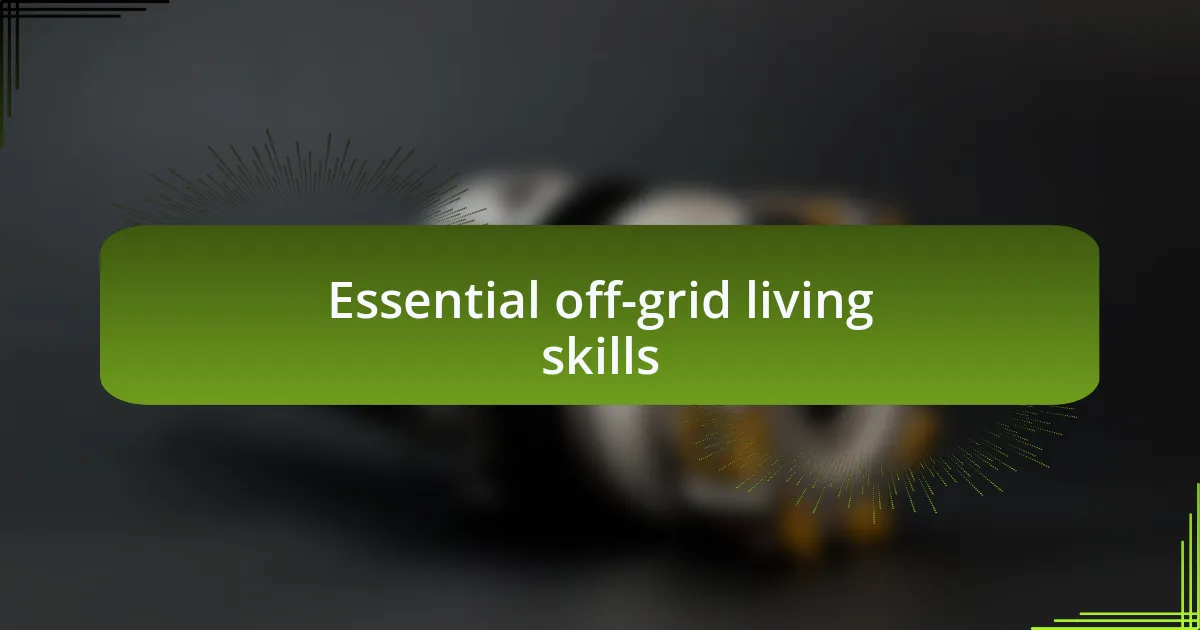
Essential off-grid living skills
Living off the grid requires a unique set of skills that go beyond just energy management. One essential skill I’ve found invaluable is self-sufficiency in food production. When I first planted a small vegetable garden, I felt a profound sense of achievement. Watching those tiny seeds sprout into vibrant vegetables not only nourished my body but also nurtured my spirit. Have you ever tasted a homegrown tomato? The flavor is incomparable, and it’s a reminder of the hard work and planning that goes into cultivating one’s own food.
Maintaining and repairing tools and equipment is another critical skill I learned through necessity. I remember a time when my solar inverter malfunctioned, throwing my whole system into chaos. Instead of panicking, I rolled up my sleeves and dove into the repair manual, discovering new terminologies and troubleshooting methods. It was both frustrating and rewarding; every problem I solved built my confidence. How often do we underestimate our capacity to learn and grow in the face of challenges?
Lastly, effective water management is paramount for off-grid living. I quickly understood the importance of rainwater collection when I faced a dry spell. Setting up my own filtration system taught me not just about access to clean water, but also the satisfaction of being resourceful. The first time I drank water that I had filtered myself was a thrilling experience. Have you considered how managing such a basic necessity can elevate your connection to nature and boost your off-grid lifestyle?
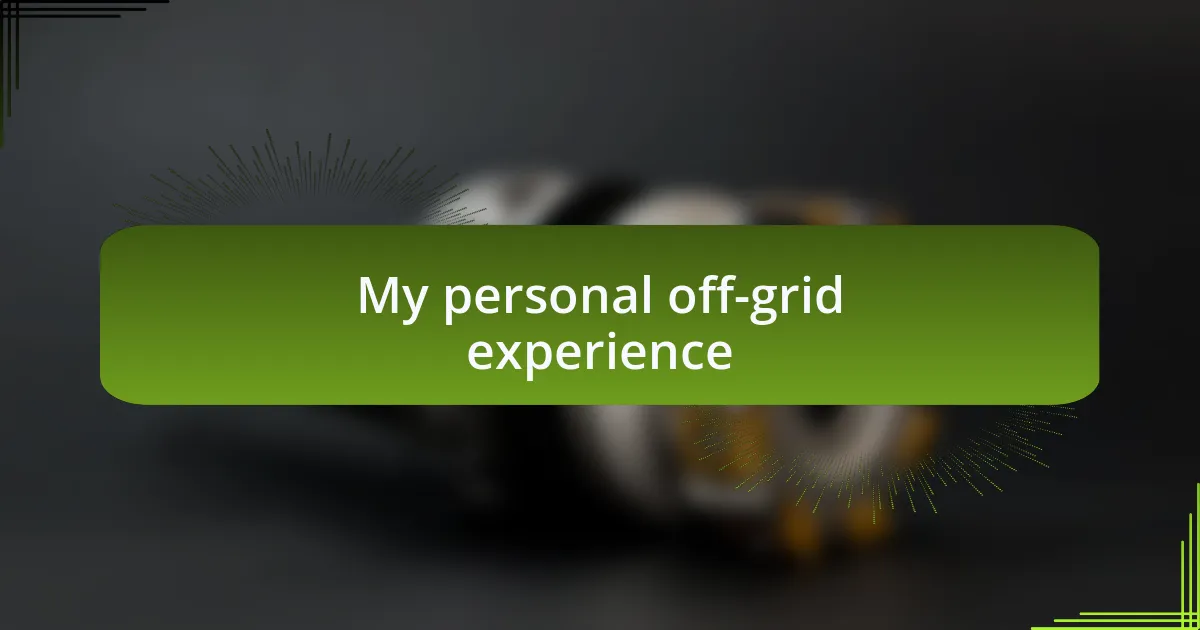
My personal off-grid experience
When I first transitioned to off-grid living, it felt like stepping into a new world. I vividly recall my first night under the stars, surrounded by the sounds of nature, and feeling both excited and apprehensive. The peace was almost palpable, but it also made me realize how much I relied on electricity, like for light and comfort. Do you remember your first experience camping in the wild, away from modern conveniences? The thrill of simplicity can be both liberating and daunting.
One unforgettable incident was the first winter I spent off-grid. I faced an unexpected freeze that threatened my water supply. I recall waking up to frosty windows and the urgency of ensuring my pipes didn’t burst. That moment taught me invaluable lessons in preparation and quick problem-solving. I realized how crucial foresight is for survival. Have you ever been caught off-guard by the elements? It’s a humbling reminder of nature’s power.
Additionally, I found joy in the quiet routines of daily life. Brewing coffee over an open flame became a cherished ritual rather than a mundane task. There’s something profoundly satisfying about creating warmth and sustenance from natural elements. It transformed the ordinary into moments of gratitude. Have you taken a moment to appreciate the simplicity of your morning routine? In that off-grid lifestyle, I developed a deeper connection with my surroundings, igniting a passion I hadn’t anticipated.
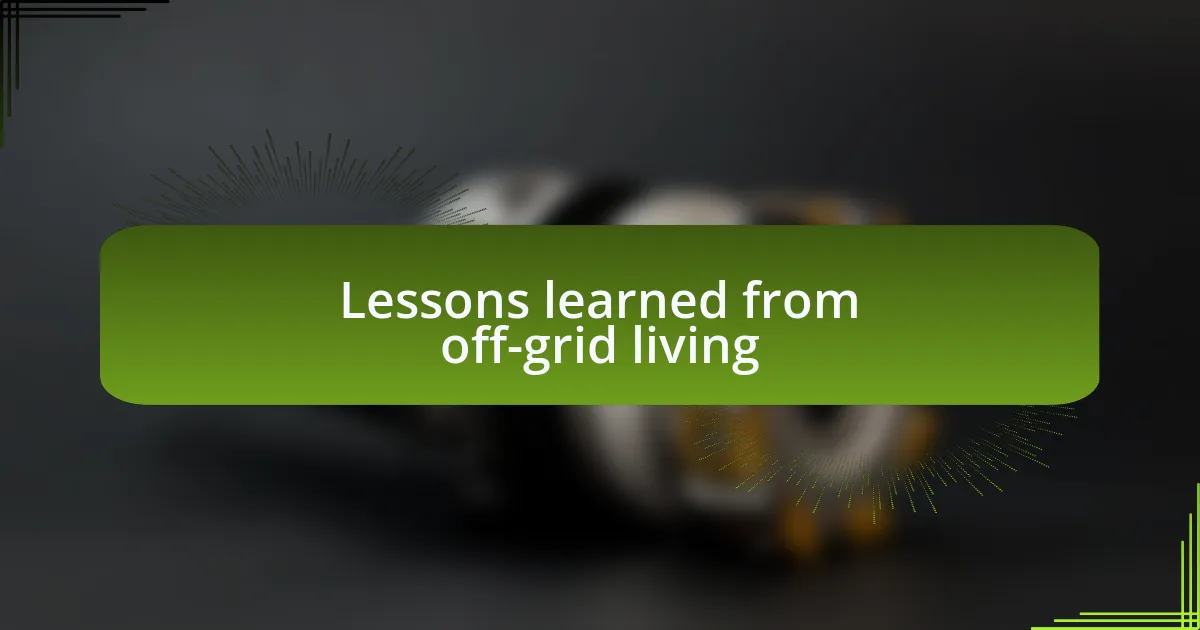
Lessons learned from off-grid living
I quickly learned that resource management is paramount when living off the grid. My initial excitement turned to concern when I ran out of fuel during an unexpectedly cold week. The scramble to find alternatives—like using firewood or solar energy—taught me the importance of planning ahead and being adaptable. Have you ever had to rethink your approach in a tight spot? It can be a valuable lesson in resilience and creativity.
Another significant insight was the importance of community. Initially, I thought I could handle everything alone, but I soon realized that sharing knowledge, tools, and resources with neighbors enriched my experience. One rainy afternoon, I found myself exchanging skills with a local carpenter; we built a fence together, combining our expertise. That collaboration transformed a mundane task into a bonding experience. Have you experienced the power of community support? In off-grid living, relationships can turn challenges into joyful opportunities.
One of the most profound lessons was learning to appreciate the small victories. The thrill of finally harnessing solar power for my lights felt monumental, akin to winning a championship. There were days filled with challenges, but each success, no matter how minor, became a reason to celebrate. Have you ever found joy in little things that others might overlook? In off-grid living, I discovered that gratitude for simple achievements fosters a deeper sense of fulfillment.